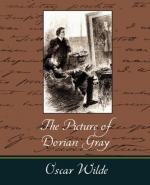A few moments afterwards the footlights flared up and the curtain rose on the third act. Dorian Gray went back to his seat. He looked pale, and proud, and indifferent. The play dragged on, and seemed interminable. Half of the audience went out, tramping in heavy boots and laughing. The whole thing was a fiasco. The last act was played to almost empty benches. The curtain went down on a titter and some groans.
As soon as it was over, Dorian Gray rushed behind the scenes into the greenroom. The girl was standing there alone, with a look of triumph on her face. Her eyes were lit with an exquisite fire. There was a radiance about her. Her parted lips were smiling over some secret of their own.
When he entered, she looked at him, and an expression of infinite joy came over her. “How badly I acted to-night, Dorian!” she cried.
“Horribly!” he answered, gazing at her in amazement. “Horribly! It was dreadful. Are you ill? You have no idea what it was. You have no idea what I suffered.”
The girl smiled. “Dorian,” she answered, lingering over his name with long-drawn music in her voice, as though it were sweeter than honey to the red petals of her mouth. “Dorian, you should have understood. But you understand now, don’t you?”
“Understand what?” he asked, angrily.
“Why I was so bad to-night. Why I shall
always be bad.
Why I shall never act well again.”
He shrugged his shoulders. “You are ill,
I suppose.
When you are ill you shouldn’t act. You
make yourself ridiculous.
My friends were bored. I was bored.”
She seemed not to listen to him. She was transfigured with joy. An ecstasy of happiness dominated her.
“Dorian, Dorian,” she cried, “before I knew you, acting was the one reality of my life. It was only in the theatre that I lived. I thought that it was all true. I was Rosalind one night and Portia the other. The joy of Beatrice was my joy, and the sorrows of Cordelia were mine also. I believed in everything. The common people who acted with me seemed to me to be godlike. The painted scenes were my world. I knew nothing but shadows, and I thought them real. You came—oh, my beautiful love!— and you freed my soul from prison. You taught me what reality really is. To-night, for the first time in my life, I saw through the hollowness, the sham, the silliness of the empty pageant in which I had always played. To-night, for the first time, I became conscious that the Romeo was hideous, and old, and painted, that the moonlight in the orchard was false, that the scenery was vulgar, and that the words I had to speak were unreal, were not my words, were not what I wanted to say. You had brought me something higher, something of which all art is but a reflection. You had made me understand what love really is. My love! My love! Prince Charming! Prince of life! I have grown sick of shadows.




